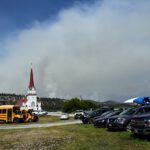Home »

Time to get smart about fire prevention
Letter to the Editor
During the summer, 343 homes were lost to wildfire in British Columbia. This is a sobering number.
Following a challenging fire season like this, reporters and governments often talk about statistics – hectares burned, properties evacuated, dollars spent, structures destroyed.
But these are more than just statistics. These were homes once filled with families and memories.
With the challenges of climate change, wildfire seasons are getting worse, here in British Columbia and around the world. We all need to do more than we have in the past, at every level, to address these challenges. Because this will take everyone – governments, communities and individuals – to move the needle on this ever-present threat.
Our government has faced many challenges in the past four years, including the record-breaking 2017 and 2018 wildfires. But not since the floods in Grand Forks has an emergency displaced so many for so long. Our shared desire is that everyone gets to rebuild quickly. But I know from past experiences that we are only at the beginning of that process. We know that rebuilding Lytton and other heavily affected areas will take time, and the province will continue to be here to offer our support as we tackle this together.
In recent years, the B.C. government has increased investment in wildfire prevention and preparedness initiatives to help keep British Columbians safe and protect the province’s natural resources and infrastructure.
We are also strongly supporting the efforts of local governments and First Nations to reduce wildfire risks in and around their communities by supporting the completion of fuel-management projects, the development of Community Wildfire Resiliency Plans, and the implementation of FireSmart principles. This work is particularly important where urban development borders on grasslands and forested areas. In the summer, we saw the difference these practices can make in Logan Lake, which has been helping to write the FireSmart playbook by preparing for wildfires for nearly 20 years.
This year, Fire Prevention Week is Oct. 3-9. I implore all communities in B.C. to take stock of their fire risks and what they can do to help prevent a disaster. FireSmart is backed by a vast amount of field, laboratory and modelling research. Its methods have been demonstrated time and time again to reduce the risk of losses, even under the most extreme fire conditions.
The FireSmart Community Funding and Supports funding stream of the Community Resiliency Investment program is administered through the Union of BC Municipalities (UBCM). It provides funding to eligible First Nations and local governments in B.C. to increase community resiliency by undertaking community-based FireSmart planning and activities that will reduce wildfire risks. Since the program was established in September 2018, government has invested in 365 grants to local governments and First Nations totalling more than $37 million.
The funding application deadline for 2022 projects is Friday, Oct. 8. The date for the next round of applications has not been finalized, but I encourage communities to visit the funding programs section of the UBCM website to learn more about the application process for the coming year: https://www.ubcm.ca/
Most importantly, individual British Columbians need to play a role in mitigating wildfire risks around their homes and properties by undertaking FireSmart initiatives. In speaking with firefighters and communities, these measures often make the difference. You’re not only protecting your own property, you’re protecting your neighbour’s, too.
The FireSmart Begins at Home manual and more information about wildfire risk mitigation is available online.
Jennifer Rice,
B.C. Parliamentary Secretary for Emergency Preparedness







